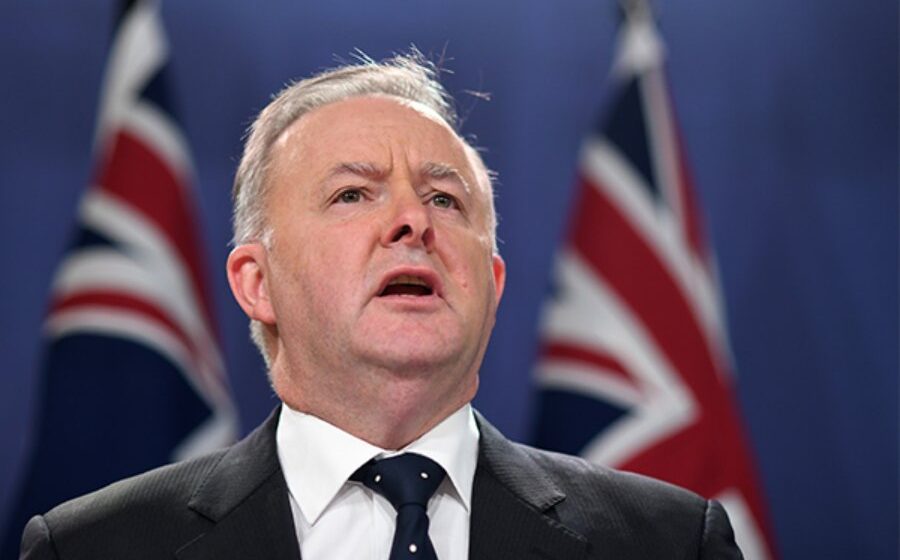If Australian Prime Minister Scott Morrison loses a general election on 21 May, his rival Anthony Albanese will form the first Labor government in almost a decade.
One of Australia’s longest-serving politicians, Mr Albanese has promised voters “renewal, not revolution” as he seeks to oust the conservative Liberal-National coalition.
His time as opposition leader has been dominated by Covid-19 and questions over whether he has cut through to voters.
But Mr Albanese has also sought to capitalise on Mr Morrison’s pandemic response and perceived unpopularity.
Along with scandals that have plagued the Morrison government – including the prime minister’s ill-timed holiday to Hawaii amid the 2019-20 bushfires – Mr Albanese has criticised the government for a slow procurement of vaccines, cost of living rises and sluggish wage growth.
Meanwhile, he’s staging what is widely seen as a “small target” campaign – keeping policies modest so they’re harder to criticise and pressure remains on the incumbent.
Although opinion polls were proven unreliable at the last election, they currently show Mr Albanese is slightly favoured to win.
So who is ‘Albo’?
Mr Albanese has earned a reputation as a defender of Australia’s free healthcare system, an advocate for the LGBT community, a republican, and a passionate rugby league fan.
The 59-year-old – nicknamed “Albo” – was raised in social housing by a single mother on a disability pension. He has often cited his upbringing as the foundation for his progressive beliefs.
Mr Albanese believed his father had died before he was born, but as a teenager he learned his mother had in fact fallen pregnant to a married man – who was very likely still alive – while travelling in Europe.
Three decades later, he tracked down Carlo Albanese, flying to Italy to meet him and his half-siblings.
Mr Albanese said his mother, Maryanne Ellery, was determined he had opportunities that she never did. With her support, he became the first in his family to finish school and go to university.
He has said creating a better world for his own son, Nathan, is the inspiration behind his public life. Mr Albanese separated from his wife of 19 years in 2019 but is joined by partner Jodie Haydon on the campaign trail.
MP for 25 years
Active in the Labor Party from a young age, Mr Albanese worked in both federal and state politics before he was elected, on his 33rd birthday, to an inner-city Sydney seat in 1996.
But it would be a decade before he got a taste of governing.
In 2007, when Labor swept to power under Kevin Rudd, Mr Albanese became the minister for infrastructure and transport.
He remained an influential figure as the party entered a tumultuous period after it replaced Mr Rudd with Julia Gillard in 2010.
When Mr Rudd reclaimed the prime ministership in 2013, Mr Albanese’s backing saw him elevated to deputy prime minister. He held the position for only 10 weeks because Labor lost an election.
Mr Albanese then put himself forward to be Labor leader. Despite being popular among rank-and-file party members, rival Bill Shorten had more support among MPs and became opposition leader.
After Mr Shorten unsuccessfully contested two elections, Mr Albanese was chosen as party leader in 2019.
Australia’s next PM?
Mr Albanese has been a leading voice of the Labor Party’s left faction, but since becoming leader he has positioned himself towards the centre.
He has stayed true to his Labor roots, promising to spend big to improve the country’s troubled aged care sector, reinvigorate its manufacturing industry, provide cheaper childcare and improve gender pay equity.
Labor has also committed to holding a referendum on enshrining in the constitution an Indigenous Voice to Parliament – an advisory body that would give Aboriginal and Torres Strait Islander people a role in shaping policies that affect them.
But Mr Albanese has at the same time insisted he is “not woke” – an appeal to more conservative voters who abandoned the party at the 2019 poll.
This has included walking back his support of more aggressive climate action policies while ramping up tougher rhetoric on China and national security.
He has also backed Australia’s controversial policy to turn back any asylum seekers arriving by boat – something he once publicly opposed.
His conservative detractors have sought to capitalise on the shift, giving him the moniker “Each-way Albo”.
Mr Albanese has also undergone a physical transformation in recent years, losing weight and debuting a new wardrobe, crediting a car crash in 2021 as a wakeup call.



